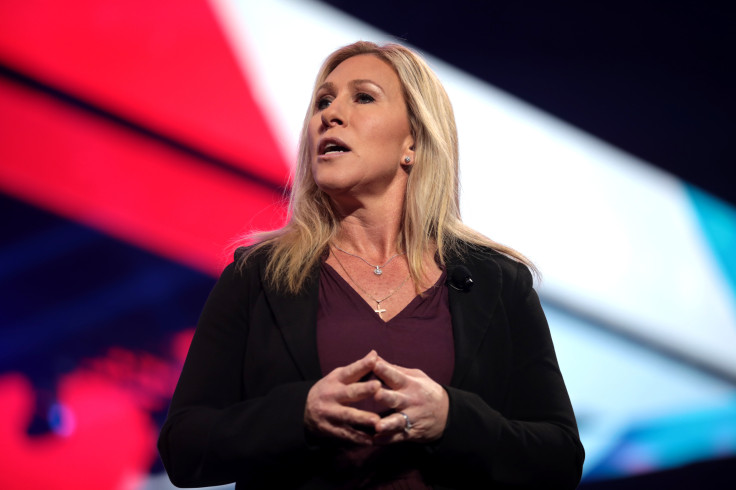Marjorie Taylor Greene Fires Back: Trump 'Attacked Me And Lied About Me' Over Epstein
Trump pulls support for Marjorie Taylor Greene amid her push for the Epstein Files release.

The political world is used to the thunder and lightning of internecine party battles, but few expected the ultimate showdown to ignite between two of the Republican party's most prominent and vociferous figures: Donald Trump and Representative Marjorie Taylor Greene. Once a seemingly unwavering alliance, the relationship between the former President and the Georgia firebrand has spectacularly imploded into a public feud.
At the centre of this dramatic rupture lies a demand for transparency—the fight over the unsealing of the files related to convicted sex offender Jeffrey Epstein.
The dispute escalated into a bitter, high-stakes confrontation after Trump publicly withdrew his support for Greene. The congresswoman wasted no time in firing back, asserting that her insistence on the release of the comprehensive documents, interviews, hard drives, and records tied to the notorious financier had pushed the former President 'over the edge'.
Greene has openly accused Trump of 'fighting to stop the Epstein files from coming out' and suggested his swift retaliation against her is an attempt to 'make an example to scare all the other Republicans' ahead of a critical vote in the House.
This is more than just a personal spat; it's a profound political crisis revealing deep divisions over an issue that transcends traditional party lines: accountability for the powerful.
The Fight for Transparency and the Epstein Files
The immediate flashpoint for this political animosity is a rare procedural manoeuvre in the House of Representatives: a discharge petition. This tactic allows lawmakers to bypass House leadership and force a floor vote on legislation if a majority of members—218 signatures—sign on.
The petition, which has successfully reached the threshold of signatures, seeks to compel the Justice Department to release the complete records, or 'Epstein files', concerning the disgraced financier's decades-long criminal activity and the subsequent federal investigation.
In a remarkable display of bipartisan defiance against both the White House and House Speaker Mike Johnson, all House Democrats and a handful of Republicans have endorsed the petition. This includes Reps. Thomas Massie, Lauren Boebert, Nancy Mace, and Greene.
Their solidarity on this issue—an apparent demand for justice and transparency for the victims—has created an unusual coalition that high-ranking Republicans are aggressively lobbying against.
Greene took to X (formerly Twitter) to amplify her claims, posting screenshots of text messages she alleges were sent to Trump or his advisors, unequivocally urging him to back the disclosure. In one message, she delivered a pointed directive: 'Stop ignoring the women.'
Her aggressive push came just as Trump announced his decision to pull his endorsement, though he attempted to frame the move as stemming from entirely different, more personal frustrations.
Trump's Retaliation and Greene's Defence
On his social media platform, Truth Social, Donald Trump excoriated the Georgia Republican, claiming the tension began when he shared an internal poll with her suggesting she had little chance of winning a higher office without his backing. He wrote that Greene 'was at 12%, and didn't have a chance (unless, of course, she had my Endorsement—which she wasn't about to get!)'.
Trump then launched into a prolonged attack, stating, 'all I see "Wacky" Marjorie do is COMPLAIN, COMPLAIN, COMPLAIN!' He further mocked her complaints that he no longer returns her calls: 'I can't take a ranting Lunatic's call every day,' and hinted at supporting a primary challenger in her district.
Greene swiftly and ferociously countered the former President's narrative, insisting she had not been calling him. Instead, she claimed the text messages concerning the documents were the true catalyst.
Greene stated that Trump 'attacked me and lied about me', and firmly concluded that her demand for the release of the documents was 'Apparently, this is what sent him over the edge. The Epstein files.'
The escalating animosity demonstrates the volatile nature of political loyalty in the MAGA movement, especially when an issue like the Epstein investigation—which has historically drawn bipartisan scrutiny and public anger—pushes into the inner sanctum of the party.
The former President also took aim at another Republican signatory, Rep. Massie, whom he criticised as a 'loser' without making specific mention of the discharge petition or the documents.
As the House prepares for the floor vote, the explosive public disagreement has irrevocably split one of the most powerful alliances in American right-wing politics, all over a non-partisan issue of transparency that has gripped the public's attention.
© Copyright IBTimes 2025. All rights reserved.





















